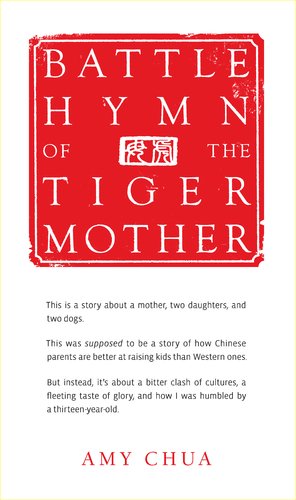Title: Battle Hymn of the Tiger Mother
Author: Amy Chua
Year: 2011
Page: 237
Genre: Non-Fiction - Memoir, Family
FTC Disclosure: Borrowed from the library
Summary (from goodreads.com):
All decent parents want to do what's best for their children. What Battle Hymn of the Tiger Mother reveals is that the Chinese just have a totally different idea of how to do that. Western parents try to respect their children's individuality, encouraging them to pursue their true passions and providing a nurturing environment. The Chinese believe that the best way to protect your children is by preparing them for the future and arming them with skills, strong work habits, and inner confidence. Battle Hymn of the Tiger Mother chronicles Chua's iron-willed decision to raise her daughters, Sophia and Lulu, her way-the Chinese way-and the remarkable results her choice inspires.
Here are some things Amy Chua would never allow her daughters to do:
• have a playdate
• be in a school play
• complain about not being in a school play
• not be the #1 student in every subject except gym and drama
• play any instrument other than the piano or violin
• not play the piano or violin
The truth is Lulu and Sophia would never have had time for a playdate. They were too busy practicing their instruments (two to three hours a day and double sessions on the weekend) and perfecting their Mandarin.
Of course no one is perfect, including Chua herself. Witness this scene:
"According to Sophia, here are three things I actually said to her at the piano as I supervised her practicing:
1. Oh my God, you're just getting worse and worse.
2. I'm going to count to three, then I want musicality.
3. If the next time's not PERFECT, I'm going to take all your stuffed animals and burn them!"
But Chua demands as much of herself as she does of her daughters. And in her sacrifices-the exacting attention spent studying her daughters' performances, the office hours lost shuttling the girls to lessons-the depth of her love for her children becomes clear. Battle Hymn of the Tiger Mother is an eye-opening exploration of the differences in Eastern and Western parenting- and the lessons parents and children everywhere teach one another.
First Sentence:
A lot of people wonder how Chinese parents raise such stereotypically successful kids.
My Thoughts:
Why this book?
- Like most people, I first became aware of this book because of the Wall Street Journal article. I think one of my friends posted it on facebook. And then, my husband emailed me about it. I thought, hey it would be a great "read aloud" choice for us (I will read the book aloud to my husband since I prefer print and he prefers audio, even though I am no where near a professional reader). I was hoping there will be more understanding between us because I am Chinese, and he is not.
- I think the title of the WSJ article is a bit misleading, but it definitely attracted a lot of attention (what, almost 8800 comments on that article alone, let along elsewhere online!)
- The red square looked like a Chinese Stone Chop / Stamp (see examples on google) so I think it is fitting. At least they didn't try to dry a tiger with the author's face on it or something
- The "Tiger Mother" part is catchy (though I keep forgetting the "Battle Hymn" part when I mentioned this book). The downside is, if I now do anything remotely like the tiger mum (being strict and stick to the principles or things, or that "the Chinese way is better"), my husband would call me tiger wife instead... sigh.
- The writing is engaging. Even though it takes me longer to read the book out loud than I would have just read it silently, we finished the book in 3 settings.
- Her writing is not perfect, and she used "for example... firstly... secondly..." a lot throughout the book. I didn't know if it's because I read it aloud that I became more aware of word choices, but she seemed to used some words repeatedly like infuriate, exasperation and virtuous.
- The books is full of different examples. The stories flowed smoothly
- While the chapters about the author's younger sister were touching, but I wasn't sure how they fitted into the book exactly? It is almost as though she included them just to pay tribute to her sister. If she wanted to show that her own parents brought up their 4 daughters the Chinese way just fine, then why not included more about the other two sisters
- Let's just say I am glad I am not the author's daughter :) While I don't agree with a lot of what she did, I don't hate her. At times I wonder if what she chose to do is really in her daughters' best interest, or for her own pride. But I guess since I am Chinese, I can see where she is coming from. While my Chinese parents aren't anywhere near as strict (my dad more so than my mum), there are definitely some similar parenting elements. If that was the way the author was brought up, and being a perfectionist that she seems to be, it is easy to see why she continues this parenting style to the extreme.
- I really would like to hear what her husband had to say. Too bad that they took out the parts about him (I think he asked to have the parts removed)
- I definitely identified with Sophia, but I wish I could be more like Lulu! Interesting, Sophia wrote an article about her mum, after all the controversies arose. I wonder what Lulu had to say. It would be interesting to see what parenting style Sophia and Lulu would choose if they have children in the future
- The author reminded me somewhat of Andre Agassi's dad (as mentioned in his memoir, Open)
- Sometimes I wonder, why the author didn't learn to play the piano or the violin herself? :)
Ending:
- I liked how it ended. I don't want to give spoilers, but it tied up a few loose ends.
- I started learning the piano when I was about 4 or 5. Made me wonder if I could have been a better pianist if my parents had pushed me harder. But I remember not liking practicing and wishing my parents wouldn't push so hard already (even though they weren't anywhere as strict as the author). I guess it is true that sometimes it is not until you are older, you start to see why your parents did what they did.
- My parents really aren't that strict :) Well, not for everything anyway!
- I think since I'd been living in a western country since I was a teenager, I could see the best and bad sides of both cultures. I guess if I ever become a parent, I just have to choose the best practice :)
- I think it helped my husband understood where I am coming from sometimes. Though I I did tell him if I ever become like the author (that extreme), stop me! The book definitely sparked some interesting conversations between us, so that's a bonus.
- Yes
Quote:
"Be modest, be humble, be simple," my mother used to chide. "The last shall come first." What she really meant of course was, "Make sure you come in first so that you have something to be humble about." (p24)
What Chinese parents understand is the nothing is fun until you're good at it. To get good at anything you have to work, and children on their own never want to work, which is why it is crucial to override their preferences. . . . Once a child starts to excel at something... he or she gets praise, admiration, and satisfaction. This builds confidence and makes the once not-fun activity fun. (p29)
My goal as a parent is to prepare you for the future -- not to make you like me. (p49)
But as a parent, one of the worst things you can do for your child's self-esteem is to let them give up. On the flip side, there's nothing better for building confidence than learning you can do something you thought you couldn't. (p62)
Western parents try to respect their children's individuality, encouraging them to pursue their true passions, supporting their choices, and providing positive reinforcement and a nurturing environment. By contrast, the Chinese believe that the best way to protect their children is by preparing them for the future, letting them see what they're capable of, and arming them with skills, work habits, and inner confidence that no one can ever take away. (p63)
Overall Rating:
4 Stars.
All reviews and posts are copyrighted by Christa @ Mental Foodie. Please do not use or reprint them without written permission.










I want to read this book. I think I would relate well with it, because while I didn't have it that strict, I did have it pretty strict. I guess an Indian household is no different - not much stress on the arts, only medicine and engineering are encouraged as career options. I guess it works sometimes. It becomes a pain when the child realizes that there is another way to growing up (as I did some years back) and then there's all this feeling of being lost.
ReplyDelete@Aths - I think you'd enjoy this one. There are definitely moments that I couldn't believe she did what she did, but I think I (and probably you) can understand where she is coming from better than non-Asian parents, like A- is just not good enough. Medicine and Engineering... yep, plus law! :) Even dentists and pharmacists are not good enough huh lol :) Looking back, I think the parents do have a point (at least sometime hehe) but sometimes the delivery could have been different. I have a few Indian friends at work, and I am amazed how similar the two cultures are.
ReplyDelete